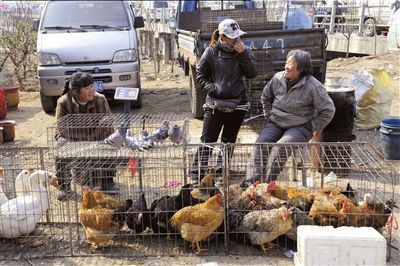Fight against bird flu
 0 Comment(s)
0 Comment(s) Print
Print E-mail China Daily, April 8, 2013
E-mail China Daily, April 8, 2013
|
Many local governments in China have banned live poultry trade outside the market and unlicensed butchering of poultry. |
The swift response of the Shanghai and other local governments to the outbreak has played a major role in preventing an epidemic. They took immediate action after the source of the virus was found, banning the trade in live poultry, culling birds and sterilizing markets. And the timely release of news about new H7N9 cases has prevented people from panicking.
Although all the cases have been reported from provinces and cities in East China, disease control and prevention centers in other parts of the country also need to be on high alert. The need to regularly sterilize all live poultry markets in the country cannot be overstated, especially because this is the season when birds migrate from the south to the north.
It is not easy to determine why some bird flu viruses mutate and afflict people. But we can take precautionary measures, like keeping poultry farms clean and sterilizing them regularly to guard against a bird flu outbreak.
Some news reports say that many farms are so overcrowded with chickens, ducks or quails that the birds cannot even move before they are taken out for slaughtering. Apart from ensuring that poultry farms are regularly sterilized, the animal husbandry department must also see to it that they have enough room for the birds to grow in a healthy atmosphere.
Besides, the rules for transporting and trading of live poultry in cities should be strengthened, because the bird flu virus can spread very fast in densely populated cities such as Shanghai and Beijing. Unlicensed poultry traders and vendors should be banned, and supervision of poultry markets strengthened.
We don't yet know whether there is a link between environmental pollution and bird flu. But a clean and healthy environment can reduce the chances of a bird flu outbreak.







Go to Forum >>0 Comment(s)